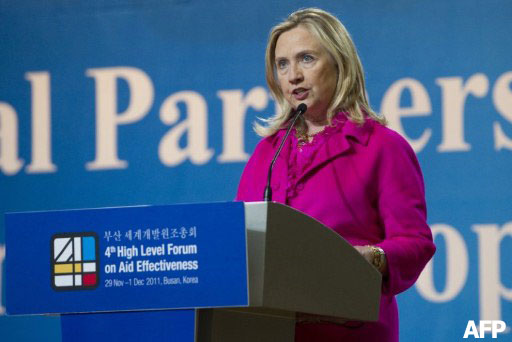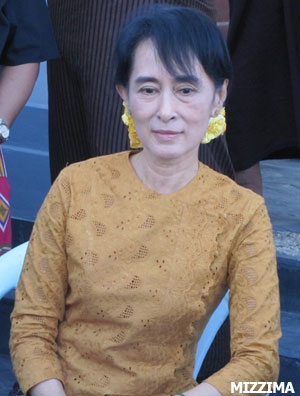Can Clinton, Suu Kyi change Burma?
(Commentary) – As the first U.S. secretary of state to visit Burma in 50 years, Hillary Clinton’s trip marks a turning point, and there is high expectation that Burma may finally be coming out of the cold.

U.S. Secretary of State Hillary Clinton speaks during the Special Session on Gender at the Fourth High Level Forum on Aid Effectiveness in Korea on November 30, 2011. Photo: AFP
Soon after its independence from Britain, British travel writer Norman Lewis wrote in the early 1950s that in comparison to Vietnam, Burma had remained isolated and mysterious. He wrote that “while in Vietnam the established authority was challenged by a united opposition with a single ideology, the Burmese government was opposed by two separate bands of communists, two versions of a heterogeneous organization called the People’s Voluntary Organization, in which many bandits had enrolled, 10,000 or so Seven Day Adventist Karens, and a small army of mutinous military police.”
Even today, while resisting the central government’s ethnocentric nationalism and chauvinism for decades, Burma’s various opposition groups, while they share a common goal for democracy, have never unified under a common leadership or set of principles.
Following the Saffron Revolution of 2007, the Burmese military regime was viewed negatively by the world at-large. With the fresh memory of monks’ blood on their hands, it could no longer use the blunt force of violence against Aung San Suu Kyi, as it did during the 2003 Depayin Massacre. The army finally released Suu Kyi from house arrest in 2010, but it has continued its brutal assaults on ethnic minorities in conflict areas. However, simultaneously, the new government began a concerted charm offensive on all fronts, including it pursuit of separate cease-fires with armed ethnic groups.
The military’s rapid warming up to Suu Kyi and the NLD caught many in the political opposition camp by surprise. There was no time to openly discuss or mull over the political choices made by Suu Kyi, but people trusted her instincts. However, some political factions still remain far apart in areas throughout the country.
Looking back to 1886, James George Scott wrote, “Large trading towns of Burma will be for all practical purposes absorbed by the Chinese traders, just as in Singapore... And Burma is a country that has never known, and can never know, famine except as a direct result of civil war and misrule. It is perhaps a pity that the Burmese have not more vigor about them, but, on the other hand, it would be a pity if so simple and contented and genial a people were to be spoilt by a new and sordid desire for the acquisition of wealth.”
Burma and China seemed so utterly different then, but since the 1988 crackdown in Burma and the 1989 uprising in China, the two countries have become key political and economic allies. The question is whether the United States can now move Burma from its deep embrace of China?

Burmese opposition leader Aung San Suu Kyi meets with musicians in November to discuss songs to use in the campaigns of National League for Democracy candidates. Photo: MizzimaWith the assassination of General Aung San, the father of Suu Kyi, after Burma’s independence from Britain, the dream of a peaceful and democratic Burma quickly faded. Distrustful of the population, the Burmese army took over political and economic control, and according to commentator Mary P. Callahan, “after cleaning house inside the army, Gen. Ne Win led the ultimate offensive against civilian parliamentary rule in March 1962.” Again in 1990, under a new name and a new set of army generals, an even more brutal military junta grabbed political power back from the election-winning National League for Democracy.
Callahan concluded that there would be no easy solutions to the problem of dissembling this security-obsessed state and replacing it with a new one that treats citizens with dignity and accountability. The removal of the handful of top generals and colonels from the government, and their replacement with fraudulently elected officials, will not transform the century-old command relationship between the state and society overnight.
Callahan also rightly noted that many ethnic minority leaders question whether a democratic government based in central Burma would really commit national resources to development programs in ethnic border areas. And as the world focuses on Suu Kyi and her political party, many minority leaders worry that their needs are not being taken into account.
The political uncertainty in Burma’s tortured history rivals that of Gorbachev and Deng Xiaoping. Surely a change of clothes from military uniforms to civilian garb cannot, at this stage, be equated with a true change of heart to embrace genuine democratic reforms in Burma.
Regardless, Clinton’s visit signifies the Americans’ willingness to invest major political capital in Burma. Clinton brings with her not only the momentum of a global outcry for freedom, but also as a leading member of the U.S. administration, she can also use her influence to help reconcile Burma’s various political factions, including the military, democracy activists, and ethnic nationalities.
As Suu Kyi says, most Burmese may not understand English, but they all know the meaning of democracy and freedom. So far, Suu Kyi seems to have set aside her differences with Thein Sein. The recent gains, including the halt of a major dam project, the symbolic release of a handful of political prisoners, and the slight relaxation of press freedoms have been attributed to their renewed relations.
Whether it is only a superficial gesture or a true commitment on the part of the current Burmese government, as Ko Myat Soe, a former student leader now living in the United States, observed, twilight is finally descending on the dictators. This is a perfect time for Clinton to go to Burma and meet with Suu Kyi.
Even though she has been released from house arrest, like all other Burmese, Suu Kyi is not yet truly free. In order to fulfill her promises and those made by her father, Burma still has to release all political prisoners and must bestow equal political rights on ethnic nationalities by laying down the groundwork for a true and democratic political process.
For Clinton, it’s a little bit of a tightrope walk right now. It requires delicate steps, one by one. But one thing is certain: it’s the twilight of the military dictators in Burma. Everyone in Burma, including the generals, wants U.S. help. Expectations are high. This is a once in a lifetime opening in which the world’s two most respected women can bring positive change to Burma.
Can history be made while the two ladies quietly sip tea together and the Burmese generals wait outside?














































